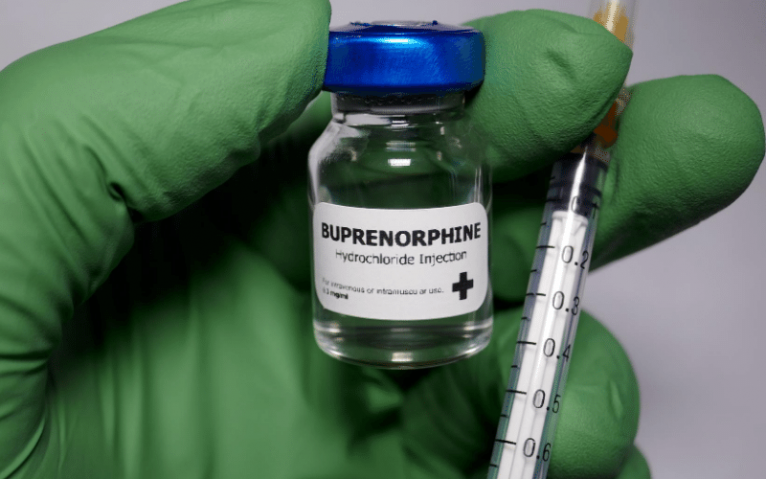Medication-assisted therapies, opioid replacement therapies, methadone, and buprenorphine maintenance are many options for using medicine to recover from addiction. Over the past several years, the most popular choice has been, by far, Suboxone (buprenorphine-naloxone) maintenance. But, how long does Suboxone stay in your system?
This question, while seemingly simple, is relatively tricky. To figure out how long it lasts, we need to look at various factors, including Suboxone’s half-life, what other medication a patient is taking, and how long Suboxone blocks opioids for.
What is Suboxone?
Suboxone mimics some of the effects of opiates, lessening the brain’s need for the actual opiate drug. This medication is relatively safe and long-lasting. Suboxone contains a combination of buprenorphine and naloxone.
Both are opioid medications, sometimes called narcotics, that block the effects of opioid medications. Because of this, It is common in addiction treatment facilities to help manage opioid use disorder.
While Suboxone is often part of medication-assisted therapy during detox and early addiction recovery, it can lead to Suboxone addiction. Misuse of Suboxone can cause addiction, overdose, or death. This is why treatment needs to happen under medical advice and supervision.
Understanding Suboxone’s Half-life
The half-life of a substance or compound is how long it takes for the body to metabolize and eliminate half of a given chemical. It’s important to note that when someone takes medicine regularly, say a daily dose of the medication; the half-life becomes longer. This is due to the chemical building up in tissues, organs, etc. This is what we know as building a dependence on a substance.
How Long Does Suboxone Stay in Your System
Generally speaking, the elimination half-life of Suboxone is between 12 hours and forty-eight hours; it usually won’t go beyond three days. That’s just a ballpark estimate, as it ultimately depends on the individual taking the drug. But, in most cases, it can stay in someone’s system for 24 to 42 hours.
Different drug tests can detect Suboxone at various lengths of time, for example:
- Saliva tests: While not commonly used to test for this particular drug, Suboxone can appear in saliva tests minutes after taking the medication, and it stays in the system for up to five days.
- Urine tests: Urine screenings are the most common tests for drugs. Suboxone will stay in urine for up to 14 days after the last dose.
- Blood tests: Rarely used, but blood tests can detect Suboxone for up to 96 hours after the last dose.
- Hair tests: Hair tests have the most extended detection window. Depending on the dose you took, Suboxone can be detected in your hair follicle for up to 1-3 months after the last use.
Suboxone is readily detectable in urine with a drug screening protocol after 40 minutes of taking the last dose. But it can take well over 60 hours for it to leave the body. Depending on how long an individual has taken buprenorphine, the amount, how frequently they take it, their weight, metabolism, and any other medications (legal or illegal) they may take. It’s also important to note that buprenorphine-naloxone may still block opioids even if it has a short half-life in a particular individual.
How Long Does Suboxone Block Opioids?
As mentioned above, it may last for hours but only block the effects of narcotics for a short time. Suboxone can block opioids for as long as three days. As Suboxone leaves your system, you’re likely to experience some withdrawal symptoms. However, several factors influence how quickly it will be flushed out of the system. These include:
- Body fat content
- Weight and height
- Age
- Metabolism speed
- Size of the last dose taken
- Amount of time the abuse has gone on
- Liver health
Modern drug tests can still detect buprenorphine metabolites created in the liver by Suboxone even after eight days of the last dose.
Is It Effective?
Suboxone treatment was approved for clinical use by the FDA back in 2002. According to SAMHSA, this medication differs from methadone treatment in that it can be prescribed in physicians’ offices.
A study published by the Taylor and Francis Group found that Suboxone could be safely administered in unsupervised settings, tolerated by most people, and promoted abstinence from opiate drug use.
Another study by the Journal of Community Hospital Internal Medicine Perspectives reports similar findings; participants of the study who remained in treatment long-term saw benefits to their overall health and wellbeing and abstinence from illicit drug use while being treated with Suboxone. One more study published in BioMed Central found that it was an effective medication in reducing buprenorphine abuse.
Warning of Suboxone Addiction
While Suboxone treatment can benefit those struggling with opioid addiction or heroin abuse, it’s not a magic solution. Suboxone can help ease withdrawal symptoms and make the initial steps of recovery more comfortable. However, it needs comprehensive addiction treatment involving behavioral therapy, group support, and more to be effective.
When someone struggles with drug addiction, it’s essential to look at their mental health state to understand their issues better. Substance abuse treatment can help them address the different hurdles and struggles they might be facing.
If you or someone you know is struggling with substance abuse, don’t hesitate to contact us. Suboxone maintenance is a treatment option available, but not the only one. At Lighthouse Recovery Institute, we believe in creating tailor-made drug abuse treatment programs that adapt to your unique needs.





